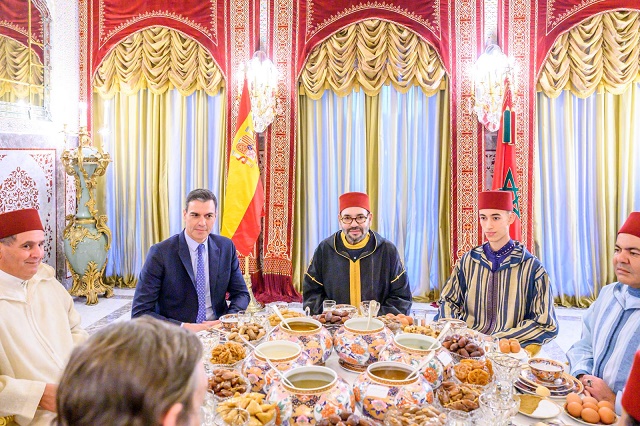Rabat – Morocco’s King Mohammed VI hosted Spain’s prime minister on Thursday in a landmark visit ending a year-long diplomatic crisis, after Madrid reversed decades of neutrality on the Western Sahara conflict in a U-turn that has angered Algeria.
The premier, Pedro Sanchez, and Foreign Minister Jose Manuel Albares were given a red carpet reception at Rabat’s main airport before heading for discussions with the king followed by iftar the evening meal in the Muslim holy month of Ramadan.
The visit aims to draw a line under a major stand-off between the two countries.
An #iftar has been held, in the Royal Palace, by HM King MohammedVI, in honor of the visit of H.E. Mr @sanchezcastejon, President of the Spanish Government, to #Morocco ?? ?? pic.twitter.com/qpXm9PmGhj
— Morocco In Finland and Estonia (@MoroccoInFinEst) April 8, 2022
But the move to drop Spain’s long-held neutrality on the Western Sahara has sparked a domestic backlash, with Spain’s parliament on Thursday condemning the move in a motion presented by a coalition partner of Sanchez.
The diplomatic crisis began a year ago when Madrid allowed Brahim Ghali, leader of the Polisario Front which seeks independence for the territory of Western Sahara, to be treated for Covid-19 in a Spanish hospital.
Morocco, which accuses Ghali of war crimes, sees the Western Sahara as an integral part of the kingdom and a highly sensitive issue of security and national pride.
ALSO READ | Four held in Morocco over Turkey-linked organ trafficking
The desert territory boasts rich Atlantic fishing waters, phosphate resources and a route to lucrative markets in West Africa.
Morocco fought a bitter war with the Polisario after Spanish colonial forces withdrew in 1975.
Weeks after Ghali’s hospitalisation, more than 10 000 migrants surged into Spain’s tiny North African enclave of Ceuta as Moroccan border forces looked the other way, in an incident seen as meant to punish Madrid.
On March 18, Madrid announced a “new stage” in relations and said it now backed the North African kingdom’s plan for the territory: limited autonomy under Moroccan sovereignty.
ALSO READ | Morocco seeks to impose solution in Western Sahara conflict
Addressing journalists after his meal with the king, Sanchez hailed the “historic moment”.
He said they had agreed “a clear roadmap that allows the management of matters of interest in a concerted manner, in a spirit of normality and good neighborliness, without room for unilateral acts.”
He also said the countries would work to restore normal border traffic between Morocco and Ceuta as well as the nearby Spanish enclave of Melilla.
‘Ambitious roadmap’
Spain’s move, widely seen as a victory for Morocco, infuriated its regional rival Algeria, which has long backed the Polisario and also supplies vast quantities of natural gas to Spain.
Algiers last month recalled its ambassador from Madrid in protest at the decision, and state-owned energy giant Sonatrach warned Friday it could increase the price of its gas sales to the country.
Sanchez has also faced a domestic backlash over the move.
Parliament denounced his reversal of a “historic” position, in a motion put forward by his coalition ally Podemos.
ALSO READ | Blinken in Morocco for security talks, to meet UAE leader
The move “amounts de facto to supporting the path proposed by Morocco by abandoning the basis for a mutually acceptable political solution”, said the motion, passed by 168 members.
Sanchez has defended the move by saying the crisis with Morocco had to be solved.
In a statement on Thursday evening, the Moroccan royal palace said the two men had “reaffirmed their desire to open a new phase in relations between the two countries, based on mutual respect and trust, ongoing consultation and honest cooperation”.
Key questions include irregular migration and smuggling around Ceuta and Melilla, two Spanish enclaves which sit on Morocco’s Mediterranean coast.
Independence squeezed
For Spain, the principal aim of mending fences was to guarantee Morocco’s cooperation on irregular migration which, observers say, Rabat has often used to put pressure on Madrid.
For Morocco, the question of Western Sahara is the top priority.
“In the long term, the independence movement’s diplomatic margin of manoeuvre is getting ever more narrow,” said Riccardo Fabiani, North Africa project director at the International Crisis Group think-tank.
Rabat controls 80% of Western Sahara, which the UN considers a “non-autonomous territory”.
ALSO READ | Two migrants drown off Morocco coast, more than 200 arrested
The Polisario waged a long armed struggle for independence from Morocco before reaching a ceasefire in 1991 on the promise of a referendum on self-determination.
But it has claimed regular, sometimes deadly attacks on Moroccan forces since declaring the ceasefire null and void in November 2020.
Former US president Donald Trump recognised Morocco’s sovereignty over the region the following month, and Rabat has since stepped up efforts to have other world powers, particularly in the European Union, follow suit.
Follow African Insider on Facebook, Twitter and Instagram
Source: AFP
Picture: Twittter / @MoroccoInFinEst
For more African news, visit Africaninsider.com


